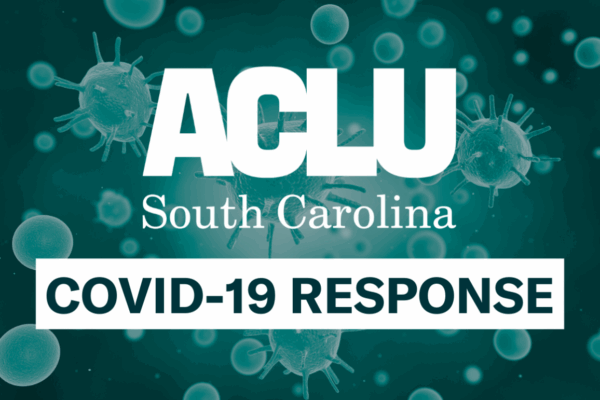Last week we, along with the national ACLU, filed a complaint with the Equal Employment Opportunity Commission (EEOC) alleging that South Carolina Governor Henry McMaster’s Executive Order 2021-12, which orders state agencies to “immediately expedite” the return of non-essential state employees to in-person work and overrules existing protocols for employees to seek reasonable accommodations, disproportionately harms women, people with disabilities, caregivers, and Black people in violation of federal antidiscrimination laws. The complaint, which was filed on behalf of the ACLU and the ACLU of South Carolina, asks the EEOC to take immediate steps to investigate the implementation of the Executive Order, and to halt the operation of the mandate that employees return to work in person, at least until the state’s care infrastructure has returned to pre-pandemic capacity, ensure that state employees with disabilities receive reasonable accommodations including remote work, and provide relief to those workers who have suffered harmful effects of the Governor's order.
“The EEOC should take immediate steps to protect all state employees who have been harmed by this hasty and unnecessary order,” said Galen Sherwin, Senior Staff Attorney at the ACLU Women’s Rights Project. “Women and people of color have already borne the brunt of pandemic-related job loss. Forcing employees to return in person before critical support infrastructure is back in place will cause new setbacks to workplace equality that could take decades to overcome. That’s not only unwise, it’s also illegal.”
Las week we, along with the national ACLU and Bloodgood & Sanders, LLC., withdrew our appeal of the denial of a request for a preliminary injunction before the South Carolina Court of Appeals in Mihal v. McMaster, a challenge to EO 2021-12, after lead plaintiff Deborah Mihal was granted an accommodation from her state agency (the College of Charleston) to continue working remotely, and after Governor McMaster, in his most recent legal briefs, clarified that state agencies and institutions can permit new remote work agreements. As a result of this shift in the Governor’s position on the Return Mandate, the ACLU and ACLU of South Carolina have created and distributed an FAQ that outlines the process state employees should follow to ask for an accommodation from their state agency to alert state employees of the Governor’s position, and are encouraging other employees who need accommodations to request them (or to renew their requests if they were previously denied.
“I am grateful that I will not be forced to choose between protecting the safety of my family and keeping my job,” said Deborah Mihal, lead plaintiff in this lawsuit. “My colleagues and I have been safely and effectively working remotely since the start of the global pandemic over a year ago. This dangerous order should never have been issued without ensuring families could line up care and get needed accommodations.”
“We are pleased that the state has done the right thing by allowing Ms. Mihal to continue her remote work schedule,” said Susan Dunn, Legal Director of the ACLU of South Carolina.
“But, the harms caused by Governor McMaster’s order are not over. While Governor McMaster’s newest legal brief makes clear that all state agencies have the authority to provide reasonable accommodations to their non-essential employees, many employees were already denied accommodations and even forced to quit their jobs, and this shift does not ensure that all state agencies will do the right thing in the future. We encourage state employees who need accommodations to seek them and to contact us if their request is denied.”
“The Governor’s shift in policy opens the door for people to seek necessary accommodations, but it is not nearly enough to protect the more than 24,000 state employees who have been working from home,” said Brian Dimmick, Senior Staff Attorney at the ACLU Disability Rights Program. “Many of these employees have disabilities and are entitled to reasonable accommodations based on their individual circumstances under federal and state law. That’s why we're asking the EEOC to conduct a systemic investigation into how the order is being implemented at the more than 138 state agencies and institutions subject to the order, and ensure that state agencies no longer have inflexible policies that force employees to choose between their paycheck and their health or safety.”
The original lawsuit was filed after the Governor ignored a letter sent from the ACLU of South Carolina and the ACLU on March 30, 2021 that outlined these same concerns and asked the Governor to rescind or delay the implementation of the Order.
Plaintiffs in the original litigation are Deborah Mihal, an employee at the College of Charleston, and the ACLU of South Carolina, a non-profit organization with members who are non-essential state employees.
More information on the EEOC Complaint, the case, and the EO 2021-12 Return in Person Order Fact Sheet can be found here.
###

